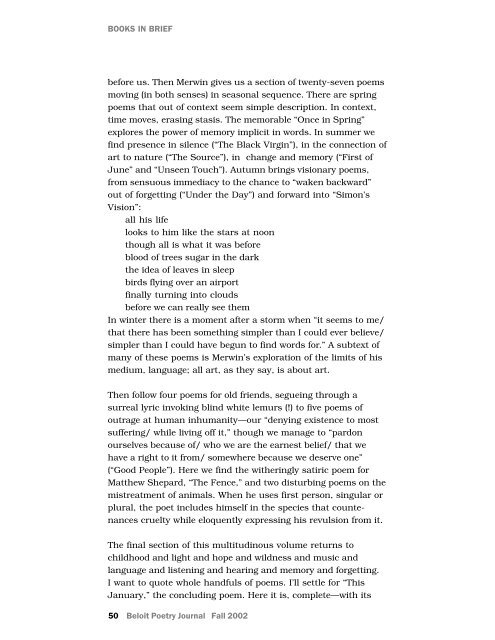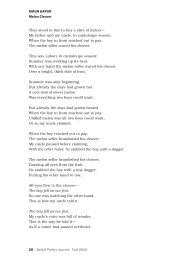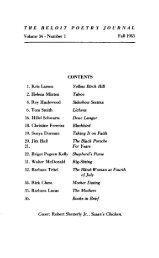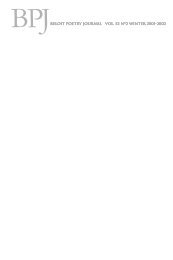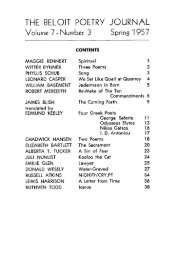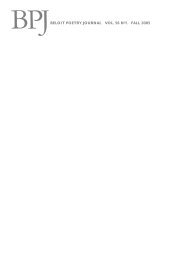You also want an ePaper? Increase the reach of your titles
YUMPU automatically turns print PDFs into web optimized ePapers that Google loves.
BOOKS IN BRIEF<br />
before us. Then Merwin gives us a section of twenty-seven poems<br />
moving (in both senses) in seasonal sequence. There are spring<br />
poems that out of context seem simple description. In context,<br />
time moves, erasing stasis. The memorable “Once in Spring”<br />
explores the power of memory implicit in words. In summer we<br />
find presence in silence (“The Black Virgin”), in the connection of<br />
art to nature (“The Source”), in change and memory (“First of<br />
June” and “Unseen Touch”). Autumn brings visionary poems,<br />
from sensuous immediacy to the chance to “waken backward”<br />
out of forgetting (“Under the Day”) and forward into “Simon’s<br />
Vision”:<br />
all his life<br />
looks to him like the stars at noon<br />
though all is what it was before<br />
blood of trees sugar in the dark<br />
the idea of leaves in sleep<br />
birds flying over an airport<br />
finally turning into clouds<br />
before we can really see them<br />
In winter there is a moment after a storm when “it seems to me/<br />
that there has been something simpler than I could ever believe/<br />
simpler than I could have begun to find words for.” A subtext of<br />
many of these poems is Merwin’s exploration of the limits of his<br />
medium, language; all art, as they say, is about art.<br />
Then follow four poems for old friends, segueing through a<br />
surreal lyric invoking blind white lemurs (!) to five poems of<br />
outrage at human inhumanity—our “denying existence to most<br />
suffering/ while living off it,” though we manage to “pardon<br />
ourselves because of/ who we are the earnest belief/ that we<br />
have a right to it from/ somewhere because we deserve one”<br />
(“Good People”). Here we find the witheringly satiric poem for<br />
Matthew Shepard, “The Fence,” and two disturbing poems on the<br />
mistreatment of animals. When he uses first person, singular or<br />
plural, the poet includes himself in the species that countenances<br />
cruelty while eloquently expressing his revulsion from it.<br />
The final section of this multitudinous volume returns to<br />
childhood and light and hope and wildness and music and<br />
language and listening and hearing and memory and forgetting.<br />
I want to quote whole handfuls of poems. I’ll settle for “This<br />
January,” the concluding poem. Here it is, complete—with its<br />
50 <strong>Beloit</strong> <strong>Poetry</strong> <strong>Journal</strong> Fall 2002


